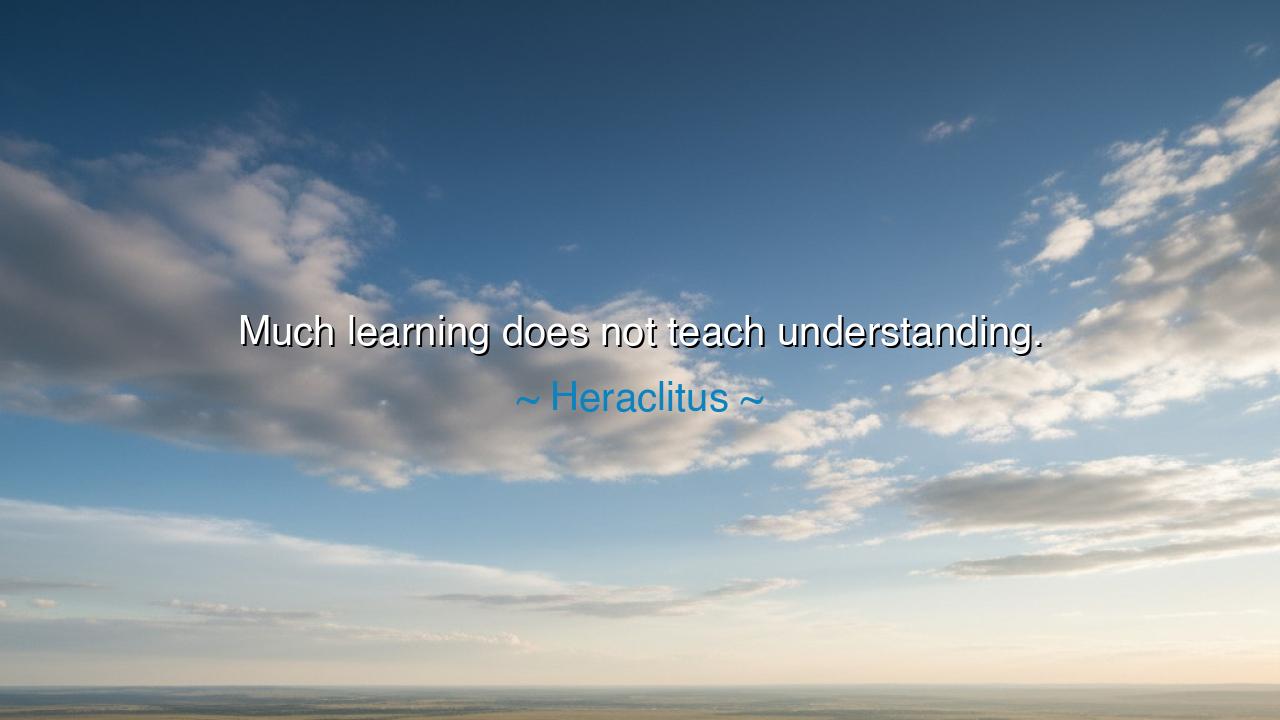
Much learning does not teach understanding.






“Much learning does not teach understanding.” — thus spoke Heraclitus of Ephesus, the dark philosopher of ancient Greece, whose words burn with quiet fire even after twenty-five centuries. He was a man who walked alone among thinkers, one who saw beneath the surface of things. To Heraclitus, knowledge without wisdom was as useless as light without warmth. In this single sentence, he revealed a truth that humbles even the most learned: that one may read a thousand books, memorize countless doctrines, and still remain blind to truth. For understanding — true understanding — does not come from accumulation, but from illumination.
Heraclitus lived in an age of thinkers who sought certainty through logic and study. Yet he looked upon their endless debates and saw that their learning often clouded their vision rather than clarifying it. “They know many things,” he seemed to say, “but they do not see.” For Heraclitus, knowledge divorced from wisdom was empty — like a vessel filled with water but lacking reflection. He believed that truth is not found in words alone, but in the harmony between mind, soul, and nature. Thus he declared: “Much learning does not teach understanding.”
To learn is to gather; to understand is to see. Many gather facts as misers gather gold, believing wealth of information makes them wise. But Heraclitus reminds us that the world cannot be understood by memory alone — it must be felt, lived, and pondered. The wise man does not seek to know everything; he seeks to know the essence. For the scholar who learns endlessly but never contemplates deeply is like a traveler who visits every land but never truly sees the sky above him.
The ancients illustrated this truth through the tale of Socrates, who, though surrounded by scholars claiming vast knowledge, humbly declared that he knew nothing. Yet in this confession lay his greatness. His humility opened the door to true insight, while others, heavy with learning but empty of reflection, could not grasp even the simplest truth. Socrates understood what Heraclitus had seen long before him — that wisdom begins not with knowledge, but with awareness: awareness of one’s ignorance, of the limits of the mind, and of the eternal mystery that no amount of study can contain.
Consider also the modern example of Albert Einstein, whose genius did not come from the volume of his learning but from the depth of his understanding. He saw what others overlooked because he could think beyond what was known. Many physicists of his time memorized equations and principles, but Einstein understood them — not merely with his intellect, but with his imagination. He once said, “Imagination is more important than knowledge.” This echoes Heraclitus’ teaching: knowledge may give information, but understanding gives vision.
Heraclitus spoke, too, of the unity of opposites — that wisdom lies in perceiving harmony where others see contradiction. This requires not much learning, but deep perception. The one who understands sees that joy and sorrow, creation and destruction, life and death are bound together. He sees the river of existence flowing endlessly, ever-changing, yet ever the same. This is the kind of understanding that cannot be taught in books or lectures — it must arise from contemplation, humility, and the willingness to see truth without distortion.
Therefore, my children, take this teaching to heart: seek not much learning, but true understanding. Read deeply, not widely. Study not to appear wise, but to become so. When you encounter knowledge, do not store it — digest it. Ask what it means, how it connects, how it reveals the nature of the world and the self. For wisdom is not in the words you remember, but in the transformation they bring to your spirit.
The lesson of Heraclitus is eternal: knowledge fills the mind, but understanding opens the soul. The scholar may know the words of the sacred text, but only the wise feel its spirit. The student may learn the laws of the universe, but only the philosopher perceives their harmony. So learn — but learn with purpose. Think — but think with wonder. And above all, seek to understand, for that is the fire that turns knowledge into light, and life into meaning.






AAdministratorAdministrator
Welcome, honored guests. Please leave a comment, we will respond soon